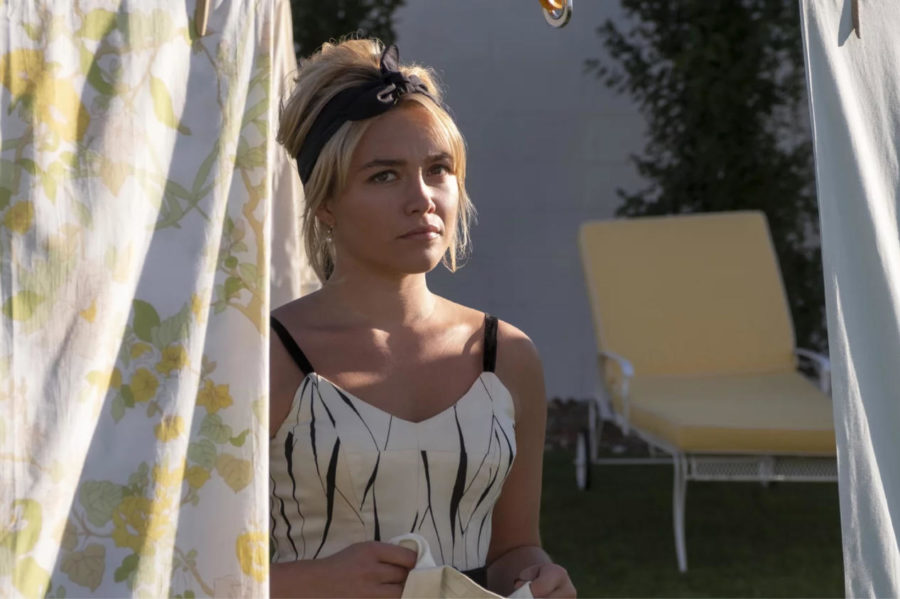Victory for Olivia Wilde? Charming thriller ‘Don’t Worry Darling’ leaves viewers wanting more
October 10, 2022
On Sept. 23, the highly anticipated thriller-horror “Don’t Worry Darling” hit the big screen. Whether or not the anticipation was justified is still debatable.
The film stars Florence Pugh (“Midsommar”), singer-songwriter Harry Styles, Chris Pine (“Wonder Woman 1984”) and director Olivia Wilde. It centers around Pugh and Styles, who assume the roles of Alice and Jack Chambers, one of the many happy couples living in Victory, a town set in the 1950s.
Less than twenty minutes after the opening scene with Ray Charles’ “Night Time is the Right Time,” Alice begins to notice that Victory’s happiness is artificial. The town consists of couples, all roughly the same age and all from very similar backgrounds. The wives cook and clean and socialize while the husbands go to work everyday; it’s a feminist-free satire. And it runs like clockwork, day in, day out.
To her credit, Alice’s life is not all keeping house — she and the other wives go shopping and swimming and take dance classes. The wives are given almost every freedom in their small town as long as they follow one rule: do not leave Victory.
This restriction is not the only weird thing about the “perfect” community.
The routine of the town never seems to change, and everyone’s routine is the same. Every morning, Alice and all the other wives on her cul-de-sac kiss their husbands goodbye. The men drive away in perfect synchronization every morning, their wives waving to them from the ends of their identical driveways and then go back inside to their identical houses.
It is not until Margaret, one of the wives and Alice’s old friend, begins to act out that Alice really starts to question the absurdness of her reality.
Soon after Margaret’s behavior starts to change, Alice watches a plane crash right outside of Victory and follows the plane in the desert. What she finds leads her to the mystery of her sandy utopia, a mystery that could reveal that Victory is not a utopia at all.
The score of “Don’t Worry Darling” is excellently crafted to match the tensions between characters and emphasize Alice’s growing realization that her reality is false. Music with creepy, airy breaths increase in tempo during moments of extreme suspense, drawing the viewer to the edge of their seat.
The music also helps place Victory into its 1950s suburbia aesthetic; hits and music styles from the time period helps set the scenes throughout the entire film.
From a visuals and props angle, few critiques can be offered. Wilde does an amazing job matching the sets to the time period and the moods of the characters.
Her use of color is especially superb. For instance, the wives’ all black leotards in the dance class creates a theme of suppression and submission. In contrast, Alice’s bright colored dresses in the scenes with Jack paints a picture of newlywed bliss.
One of the biggest drawbacks from “Don’t Worry Darling” is the lack of original material.
Wilde takes themes and cliches from several thriller-horrors, making parts of her film feel like every other thriller movie. Pugh and Styles’ perfect Americana relationship, Chris Pine’s creepy cult-leader persona, the spooky synchronous actions of the town — it all feels like it’s been done before. In short, it is a thriller, but it resembles every other recent thriller.
The holes that are left gaping in the story’s plot line must also be noted. Wilde does a good job of drawing the audience into the story and getting them invested in Alice’s descent into madness and the sketchy origins of Victory, but there are too many unanswered questions left when the credits start to roll. A good thriller should leave some mystery to its audience, but “Don’t Worry Darling” just leaves viewers confused and wondering what really happened in Victory.
Wilde sets the stage for a fantastic thriller, but flaws in storytelling mean a poorly developed plot and dissatisfaction among moviegoers.
“Don’t Worry Darling” is still playing in theaters and will move to streaming services later this year.




















































































































































